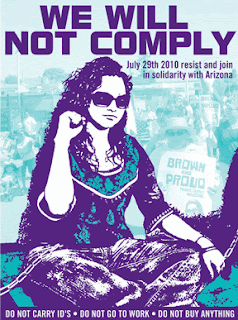As a socialist, it goes without saying that I do not think that housing, land-use and urban investment should be controlled and run solely in the interests of profit. Thus, I am a critic of what's called gentrification. But to be a socialist, or to oppose the reign of landlords and rich developers over and above tenants and the masses of people, is to be against gentrification for a specific set of reasons. Unfortunately, one rarely runs across such reasons in most mainstream discussions of gentrification. Instead one gets a straw-person account of the critical position, wherein the opponent of gentrification is against it for merely "cultural" reasons (e.g. they hate coffee shops, artisan bread bakeries, sidewalk beautification projects, etc.). The struggle for or against gentrification thus becomes a struggle for or against certain consumer preferences, for or against certain consumer lifestyles ("gritty" bohemian or working-class life vs. the clean-edged modern design of frou-frou bars and restaurants). This is a distortion.
At its absolute worst, the pro-gentrification crowd frames the debate as follows. There are two choices: (1) economically depressed slum plagued by crumbling infrastructure and high crime, or (2) an economically growing neighborhood (increasingly populated by rich white people exclusively) in which property values are on the rise and commercial investment revitalizes housing stock, roads and schools. Having framed the argument in this way, the pro-gentrification folks (for an excellent example, see the strictly disciplined political line taken over at Uptown Update) have little trouble in ridiculing any and all critics: they simply prefer crime-ridden neighborhoods that have crumbling infrastructure and no jobs.
Or, to take the "cultural" manifestation of this framing of the question, we could say that the opponents of gentrification simply hate the following things in themselves: modern architecture, artisan cafes, coffee shops, art galleries, bars and restaurants, boutiques, etc. In other words, the opponents of gentrification just have a problem with such "white" things as bread, coffee, art, good schools, and jobs. Insert the racist "culture of poverty" argument here to give the claim a "scientific" veneer.
Now everyone with a brain should know that this framing of the "debate" is complete bullshit. No rational person wants crime, crumbling infrastructure, underfunded schools, slumlord-ruled housing, unemployment, etc. Moreover, there is little reason to think that the yet-to-be-dispossessed simply have different "cultural" preferences that motivate their criticisms of gentrification. In contrast, what the critics of gentrification oppose is precisely the prescribed choice imposed on us in the framing of the question discussed above.
Here's an example. Take the Lawndale neighborhood on the West side of Chicago. Traditionally, Lawndale was always a working-class neighborhood populated by various immigrant communities and, more recently, black people. At one time Lawndale was a center for the working-class Jewish community in Chicago. It has, to be sure, seen its up's and down's, but today it is in worse shape than it has ever been. The reasons why are not particular to Lawndale whatsoever: de-industrialization, capital flight, severe population loss, ruthless criminal landlord practices, racism, etc. all ravaged the community from the 1960s onwards.
Martin Luther King, Jr. actually moved to Lawndale in the late 1960s in order to draw attention to the severe neglect and poverty afflicting black people in Northern cities (it had been a favorite position of many moralizing white liberals in the 1960s that racism was merely a problem in the South).
Today, Lawndale is dire straits. It has hundreds of liquor stores but only one grocery store. (Jonathan Kozol writes that it had in the early 1990s "one bank, one supermarket, 48 state lottery agents ... and 99 licensed bars." and that, according to the 1980 census, 58 percent of men and women 17 and older had no jobs). This is a familiar story. Most of the big companies and factories that employed the community in the first half of the 20th century have closed down or moved overseas to find more easily exploited labor. Today the roads in Lawndale are in such bad shape that they were recently featured in an article in the Chicago Reader.
So, what hope does a neighborhood like Lawndale have as long as investment, land use, and so on are controlled by profit-seeking capitalist investors?
Within the coordinates of profit, Lawndale is not a neighborhood populated by a community of people with needs, talents, and interests. On the contrary, from the perspective of capitalists, Lawndale is one of two things: either its a profitable investment or it isn't. And, surprise surprise, profitable investments are typically those that lure in the spending capacities of the rich, most of whom are white. The result is that the social problem, the injustice, of Lawndale doesn't register; capitalism is deaf to human needs when they aren't backed by cold, hard cash.
So, just imagine that capitalists tried gentrify Lawndale (they've attempted to do it, by the way, in the crumbling East Garfield Park neighborhood on the West Side). Suppose that residents of Lawndale, even some who'd been living there for 30+ years, were beginning to be priced out of their own apartments by rising rents and costs of living. Now the residents' political anger at this situation wouldn't have anything to do with so-called "cultural" preferences. On the contrary, their anger would be over the fact that they are given an unfair and oppressive choice: either accept broken schools and crumbling roads, or get out and make room for the rich.
When seen for what it is, gentrification presents us with a deep contradiction in capitalist development. And we forget at our own peril that capitalist control of land use and housing isn't natural or inevitable. It's made by human beings. And what human beings have made they can tear down. But community, democratic control over land use, housing, and investment will not be on offer unless it is demanded by pressure from below.
Read More...
Summary only...





